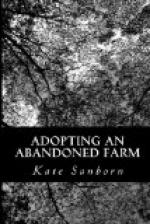But at last I knew. I asked an honest man from afar, who called to sell something, why those ducks would not lay a single egg. He looked at them critically and wrote to me the next day:
“DEAR MADAM: The
reason your ducks won’t lay is because they’re
too
old to live and the bigest
part of ’em is drakes.
Respectfully,
JONAS HURLBERT.”
I hear that there are more ducks in the Chinese Empire than in all the world outside of it. They are kept by the Celestials on every farm, on the private and public roads, on streets of cities, and on all the lakes, ponds, rivers, streams, and brooks in the country. That is the secret of their lack of progress. What time have they to advance after the ducks are fed and cared for? No male inhabitant could ever squeeze out a leisure half-hour to visit a barber, hence their long queues.
About this time the statement of Mr. Crankin, of North Yeaston, Rhode Island, that he makes a clear and easy profit of five dollars and twenty cents per hen each year, and nearly forty-four dollars to every duck, and might have increased said profit if he had hatched, rather than sold, seventy-two dozen eggs, struck me as wildly apocryphal. Also that caring for said hens and ducks was merely an incident of his day’s work on the large farm, he working with his laborers. Heart-sick and indignant, contrasting his rosy success with my leaden-hued failure, I decided to give all my ducks away, as they wouldn’t, couldn’t drown, and there would be no use in killing them. But no one wanted them! And everybody smiled quizzically when I proposed the gift.
Just then, as if in direct sarcasm, a friend sent me a paper with an item marked to the effect that a poor young girl had three ducks’ eggs given her as the basis of a solid fortune, and actually cleared one hundred and eighteen dollars from those three eggs the first year.
Another woman solemnly asserts in print a profit of $448.69 from one hundred hens each year.
The census man told me of a woman who had only eighteen hens. They gave her sixteen hundred and ninety eggs, of which she sold eighteen dollars’ worth, leaving plenty for household use.
And my hens and my ducks! In my despair I drove a long way to consult a “duck man.” He looked like the typical Brother Jonathan, only with a longer beard, and his face was haggard, unkempt, anxious. He could scarcely stop to converse, evidently grudged the time, devotes his entire energies from dawn to twilight to slaving for his eight hundred ducklings. He also kept an incubator going all the time.




